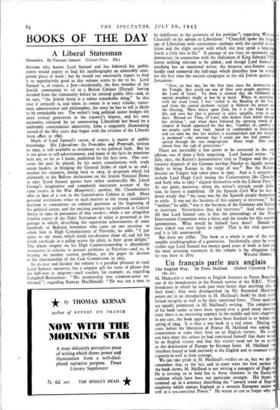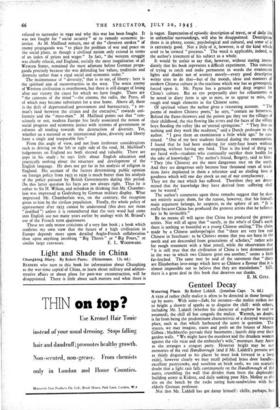Un francais parle aux anglais
M. MAILLAUD is well known to English listeners as Pierre Bourda one of the broadcasters in the French service of the B.B.C. The broadcasts in which he took part were better than anything else their kind ; they were distinguished (as Mr. Raymond Mortim points out in an introduction to M. Maillaud's book) by their intel lectual integrity as well as by their emotional force. These quali are equally prominent in M. Maillaud's writing. The composiu of his book seems to have been spread over a good many month since there is an increasing urgency in the middle and later chapters in any case, the book appears to have been finished in or before rh spring of 1944. It is thus a war book in a real sense. During the years before the liberation of France M. Maillaud was asking countrymen to stake their lives on an English victory. He cou not have done this unless he had convinced himself that there woul be an English victory and that this victory need not be as steril as the-domination of Europe by German force. M. Maillaud therefore bound to look narrowly at the English and to measure the capacity as well as their courage.
We can take pride in M. Maillaud's verdict on us, but we thou remember that, as the' last, and in some ways the best section the book shows, M. Maillaud is not writing a panegyric of Engla He is inviting us to hold fast to those elements in the Europe tradition which have been our particular strength. His theme summed up in a sentence describing the " inward trend of Eng:i insularity which stamps England as a western European nation well as a sea-conscious Power." He warns us not to forget why refused to surrender in 194o and why this war has been fought. It was not fought for " social security " or to remedy economic in- justice. As M. Maillaud notices, one of the "cleverest strokes " of enemy propaganda was " to place the problem of war and peace on the social plane, as though a civilised nation only existed in terms of an index of prices and wages " In fact, " the western struggle was chiefly ethical, and England, socially the most inegalitarian of all Western States, remained the most adamant before German propa- ganda precisely because she was defending her values, traditions and diversity rather than a rigid social and economic order." The maintenance of " diversity," that is to say, of liberty : here is the spiritual aim of reconstruction in the west. The worst enemy of Western civilisation is overthrown, but there is still danger of losing after our victory the cause for which we have fought. There are " the canteens of the mind "—the cinema, the radio, the Press, all of which may become substitutes for a true home. Above all, there is the drift of depersonalised government and bureaucracy, " a no- man's land between the citizen and the executive," towards uni- formity and the " mass-man." M Maillaud points out that " con- sciously or not, modern Europe has lately associated the notion of social progress and economic justice with systems of government or reforms all tending towards the destruction of diversity. Yet, whether on a national or an international plane, diversity and liberty have a single and inseparable fate."
From this angle of view, and not from irrelevant considerations such as driving on the left or right side of the road, M. Maillaud's judgements on England are both shrewd and valuable. There are gaps in his study ; he says little about English education and practically nothing about the structure and development of the English language. He does not get far in his analysis of religion in England. His account of the factors determining public opinion on foreign policy from 1933 to 1939 is much better than his analysis of the policy pursued by British Governments during this period. On this latter question his facts are not always right. Thus he is unfair to Sir H. Wilson, and mistaken in thinking that Mr. Chamber- lain was impressed at Godesberg by German military display. What impressed Mr. Chamberlain was, on the contrary, the reception given to him by the civilian population. Finally, the whole policy of appeasement after 1933 cannot be understood (this does not mean " justified ") unless it is remembered that the very word had come into English use not many years earlier by analogy with M. Briand's use of the French term apaisement.
These are only minor criticisms of a very fine book ; a book which confirms my own view that the future of a high civilisation in Europe depends more upon detailed Anglo-French collaboration than upon anything involving " Big Threes " or " Big Fours," or



























 Previous page
Previous page